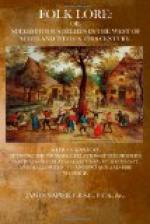dispute and decide every controversy. On that
occasion, all the fires in the country were extinguished
on the preceding evening, in order to be supplied
next day by a portion of the holy fire which was kindled
and consecrated by the Druids. Of this, no person
who had infringed the peace, or become obnoxious by
any breach of law, or guilty of any failure in duty,
was to have share, till he had first made all the
reparation and submission which the Druids required
of him. Whoever did not, with the most implicit
obedience, agree to this, had the sentence of excommunication
passed against him, which was more dreaded than death;
none being allowed to give him house or fire, or shew
him the least office of humanity, under the penalty
of incurring the same sentence.” The ancient
Romans held a great and popular festival at the end
of February, called the Ferralia. At this
season, they visited the graves of their departed
friends, and offered sacrifices and oblations to the
spirits of the dead; they believed that the spirits
of the departed, both the good and the bad, were released
on that particular night, and that, if they were not
propitiated, these spirits would haunt throughout
the coming year their undutiful living relatives.
In all probability, though the time of celebration
is different, these Roman ceremonies and the Hallowe’en
ceremonies in this country had a common origin.
In the year 610, the Bishop of Rome ordained that the
heathen Pantheon should be converted into a Christian
church, and dedicated to all the martyrs; and a festival
was instituted to commemorate the event. This
was held on the first of May, and continued to be held
on this day till 834, when the time of celebration
was altered to the first of November, and it was then
called All Hallow, from a Saxon word, Haligan,
meaning to keep holy. This change was doubtless
made in order to supply a Christian substitute for
some heathen festival—in all probability
the festival of Sham-in, which, as we have seen,
was an old Druidical feast. Some time after this
alteration in the time of holding the feast in honour
of the martyrs, in 993, another festival was instituted
for the purpose of offering prayers for the souls of
those in purgatory, and this feast was kept on the
second of November, and was called All Souls.
The following legend was either invented as a plausible
reason for instituting this additional feast, or the
legend, being previously well known and accepted as
truth, was really the bona fide reason for
the institution:—“A pilgrim, returning
from the Holy Land, was compelled by storm to land
upon a rocky island, where he found a hermit, who
told him that among the cliffs of the island was an
opening into the infernal regions, through which huge
flames ascended, and where the groans of the tormented
were distinctly audible. The pilgrim, on his
return, told the Abbot of Clugny of this, and the Abbot
appointed the second day of November to be set apart




